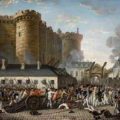(f) The poor harvest (1787-1789)
The general expansion of the French economy since the 1730s was interrupted by periodic economic crisis which hit the unprivileged the hardest. In particular, it was the crop failures and consequent crises of the years 1787 to 1789 which led to food shortages, corresponding sharp rises in prices, a decrease in textile production, and widespread unemployment in cities. The misery which resulted in the cities as well as in rural areas from these short-term economic crises and crop failures created an explosive situation, which could be ignited by unpopular political decisions.
The rural-urban drift as a result of the crop failures created the so called Paris mob, which was restless and ready to explode into action. The poor crops of 1788 not only caused incessant rises in prices between 1788 and 1789, but also drastically reduced the purchasing power of the people and hampered international trade. Unemployment was therefore rife at the precise moment when the cost of living was rocketing. Lefebvre quite justifiably asks: “How can anyone fail to suspect a connection between this ordeal and the furore of insurrection that gripped the population at the time?”.






